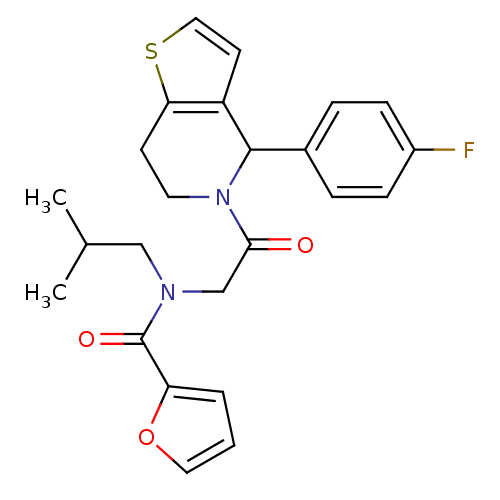

 Search and Browse
Search and Browse
 Download
Download
 Enter Data
Enter Data
| Target/Host (Institution) | Ligand | Target/Host Links | Ligand Links | Trg + Lig Links | Ki nM | ΔG° kJ/mole | IC50 nM | Kd nM | EC50/IC50 nM | koff s-1 | kon M-1s-1 | pH | Temp °C |
|---|---|---|---|---|---|---|---|---|---|---|---|---|---|
| Cannabinoid receptor 1 (Homo sapiens (Human)) | BDBM50296152 (CHEMBL562123 | N-(2-(4-(4-fluorophenyl)-6,7-dihydr...) | PDB NCI pathway Reactome pathway KEGG UniProtKB/SwissProt UniProtKB/TrEMBL DrugBank antibodypedia GoogleScholar AffyNet | CHEMBL PC cid PC sid UniChem | Article PubMed | 875 | n/a | n/a | n/a | n/a | n/a | n/a | n/a | n/a |
Vernalis (R&D) Ltd Curated by ChEMBL | Assay Description Displacement of [3H]rimonabant from human CB1 receptor expressed in HEK293 cells by liquid scintillation counting | Bioorg Med Chem Lett 19: 4183-90 (2009) Article DOI: 10.1016/j.bmcl.2009.05.114 BindingDB Entry DOI: 10.7270/Q2XP75VT | |||||||||||
| More data for this Ligand-Target Pair | |||||||||||||
| Cannabinoid receptor 1 (Homo sapiens (Human)) | BDBM50296152 (CHEMBL562123 | N-(2-(4-(4-fluorophenyl)-6,7-dihydr...) | PDB NCI pathway Reactome pathway KEGG UniProtKB/SwissProt UniProtKB/TrEMBL DrugBank antibodypedia GoogleScholar AffyNet | CHEMBL PC cid PC sid UniChem | Article PubMed | n/a | n/a | n/a | n/a | 4.40E+3 | n/a | n/a | n/a | n/a |
Vernalis (R&D) Ltd Curated by ChEMBL | Assay Description Inverse agonist activity at human CB1 receptor by [35S]GTPgammaS incorporation assay | Bioorg Med Chem Lett 19: 4183-90 (2009) Article DOI: 10.1016/j.bmcl.2009.05.114 BindingDB Entry DOI: 10.7270/Q2XP75VT | |||||||||||
| More data for this Ligand-Target Pair | |||||||||||||